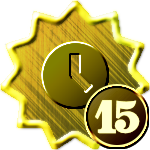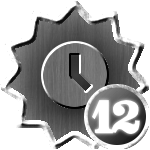
dddhgg
Members-
Posts
32 -
Joined
-
Last visited
-
Days Won
1
dddhgg last won the day on April 26 2011
dddhgg had the most liked content!
About dddhgg

dddhgg's Achievements
-
What IS your problem? Did I say I hated the 20th Century and wanted to return to the dark ages? No way. I quite like living right now, because of the freedom we're enjoying (in the West at least), the endless technological possibilities, etc. I'm just saying that our times really are troubled and have fundamental issues, reflected in its art, and that a return to earlier modes of thought could very well result in something positive. Yes, I know, you can't have your cake and eat it, but can't we at least try to change our ways by reflecting on the past a bit more? I repeat: Western culture as it stands is leading us nowhere, and no amount of modern technology will be able to save us from either the Chinese or the Muslims from running us over, both culturally and otherwise. (No racism intended. On the contrary, I admire the vitality of Islam as compared to half-dead Christianity.)
-
Ridiculous! I appreciate all your arguments, up till the point where you suddenly derail and start jabbering about "being human". I just think it's very unfair of you to pontificate about such non-musical issues, of which everyone is equally knowledgeable or equally ignorant (depending on one's view). "Being human means X" almost always amounts to egocentric special pleading.
-
Only the ignorant readily accuse others of ignorance. Did I say that originality and creativity were absent pre-1850? Well, did I? No. What do you think I am? Some kind of moron who only listens to Bach? Of course I know that music from 1300 is vastly different from that from 1700, and that this didn't come about by composers just copying another. And you know what, I think that's a good thing. What I was saying is that in the Romantic period there arose this ideal of the artist (composer) as one who against all odds expresses him/herself in a way that is radically, and in a sense absolutely, original. This ideal, I repeat, did not exist prior to the 19th Century, except perhaps in a few isolated eccentrics. Also, I meant to say that this ideal has become so thoroughly perverted over the course of the 20th Century that it has lost all touch with reality and given us "music" such as Cage's "4:33", or random noise as ordinary people call it. I won't address your other points right now, as it's rather late and I need some sleep. Let me just say that I don't particularly enjoy being lectured to on "what it means to be human" (whatever you mean by that). You're not in a better position to know what a human is than I am, pal.
-
Yeah sure, everything has a structure, as per the laws of physics and mathematics. So, does that make everything art? If so, what's the point of saying "art" instead of "just anything"? I recently listened to 4:33 by John Cage, for example. It, or rather what it stands for, cannot cease to annoy the crap out of me. By the way, I think I'm going to compose this really beautiful symphony, using my own farts.. :) By the way, who says that I didn't study 20th Century art history? (Which you seem to be implying.) Not everyone who studies, say, 13th Century art history necessarily accepts 13th Century art as having much merit in and of itself. Simply because we were born in the 20th Century (I suppose you're older than 11) and still live in its wake, so to say, doesn't mean that we don't have the right to say that much of the "art" produced in that century is worthless, indulgent, self-congratulating rubbish. I seriously believe that Western civilization is in a state of decay, and that its art reflects it. This conviction is growing stronger and stronger, the more I study modern society and its art. A wholesale return to our cultural or even religious roots would do us lot of good. But on the other hand, the antagonism between reactionaries and progressives can't really be resolved, not now at least. History will decide perhaps. I can at least see how the 20th Century might possibly be viewed as somewhat of an anomaly, a period of extreme decadence - or not. I'm happy to have mathematics as an escape; at least there's real progress in that.
-
Of course, music is a "higher" trade than fishing or butchering. (Though not necessarily more useful. :)) But I do see that creating music is a trade in that it consists of certain fixed skill sets, certain procedures and, up to a point, a certain objective standard of quality. A better analogy than the wheel - you're right about that - would be the making of shoes. Shoes should fit and, although some ladies disagree, be suitable for walking and be sturdy enough to withstand wear and tear. That's the trade part of shoe making. Similarly, music should be pleasing to the ear and/or mind, though not in any facile way (I'm not against atonality per se), and should at least reflect some part of the emotional spectrum of the listener. Also, there should be some minimal amount of structure present; otherwise my beautifully whistling tea kettle would produce "music". The art part of shoe making is to make the shoe pleasing to the eye and to imprint something called "style" on it. The art part of music is to speak with one's own voice so to say.
-
With all due respect, but I suppose you (and many others as well) are way too caught up in this essentially 19th Century - and by no means universally valid - idea that creativity and originality is the alpha and omega of art (music in particular). I simply think it's not. Is writing a good 18th Century style fugue - which I'd really be interested in doing by the way, if I had the talent - necessarily inferior as art to, say, inventing your own new harmonic language? I'd say no. (A lovely example of neo-baroque composition: .)Personally I believe that this overemphasis on innovation and revolutionizing, and the corresponding de-emphasis of what I call the craft or trade of music, which has been growing gradually worse since about 1850, has lead to a major crisis in Western aesthetic ideals, to the point of almost eroding them into non-existence. What's the point in writing exciting new music if it's so new and exciting as to be only accessible or enjoyable to an elite few? (I'm thinking serialism or aleatoric music here, not your own compositions, which I respect.) I'm not saying that we should just stupidly repeat or regurgitate the past, if that were even possible. The major challenge of art in our days, as I see it, is to use and carefully transform old traditions in order to express things that are relevant to us today. But that of course entails thoroughly knowing and understanding those traditions. My "archetype" of the truly modern composer is Arvo Paert (his later, tonal phase, that is), or even more extremely John Tavener.
-
Where do you get all this historical knowledge from? You almost sound like you were actually there. :) I don't know who Bach's favorite pupil was (if he even had one). Fact is, that while some of Bach's pupils indeed adhered closely to the master's style (like Krebs indeed, or his cousin Johann Bernhard), others diverged from it, such as his three most famous sons - Johann Christian being the youngest and most noticeable example. That doesn't sound like a tyrant trying to press his pupils into the exact same mold. I suppose this is what happened: the lads who were sent to Bach as pupils got a good thorough grounding in keyboard playing, basic theory, improvisation, harmony exercises (chorales etc.), counterpoint, and eventually some free composition for the really talented. Bach never showed any sign of putting his own musical tastes and procedures above that of others, and was quite eager to assimilate all sorts of different styles during his lifetime, and admired many other composers with styles different from his (Handel, Zelenka, etc.). Of course, didactics were different in the 18th Century from what they are now. I'm not saying that we should try and recreate Bach's teaching model in every detail. What I'm saying is that it makes perfect sense to learn harmony by example and actually doing things (composing chorales) and not by precept. As for myself, some time ago I began elaborating 18th Century basso continuo parts (just as an exercise), and the results are starting to show. Your ideal of just composing and finding your own way sounds very nice, and in a way even romantic, but I think that's just taking too long. I want to learn the trade well, and only after that find my own voice. Why invent the wheel time and time again, when others have already done that for you?
-
Copies of himself? If that really is the case, which I honestly doubt, then he didn't succeed very well, by any standard. His three most talented pupils, his sons Wilhelm Friedemann, Carl Philip Emmanuel and Johann Christian, all wrote very independent music that was completely different from that of their father. Come to think of it, I believe Bach's way of teaching composition, as I understand it, does make sense even today (with a few minor modifications). Harmonizing chorale melodies in four parts seems excellent practice.
-
Hahaha, brilliant. :D @SYS65
-
Importance of aural skill for composers
dddhgg replied to computers70's topic in Composers' Headquarters
I think it's exactly the other way round: if music were just the art of sound, then there would be little else but randomness. My tea kettle makes a really lovely and aesthetic sound, but that doesn't alter its being "chance noise". For me music is the art of beautiful temporal proportions, with instrumental and vocal sound as its more or less arbitrary and, arguably, interchangeable medium - simply because most people happen to be much more sensitive to temporal proportion if it's presented in an aural form. Pythagoras, for example, defined musical intervals in terms of frequency ratios, or rather ratios of string lengths, composed of small integers (octave 1:2, perfect fifth 2:3, etc.). So if our hypothetical deaf composer could find a way of relating, for example, the temporal ratio 64 : 81 : 96 (the major triad in just intonation) to high aesthetic pleasure (for example by translating it into dance paces), then he/she could compose a progression of major triads, which would be completely equivalent to a hearing composer strumming it on his/her guitar. Of course this is just a simple example, which neglects note duration among other parameters, but I think such a thing could be done on a much more elaborate scale. I think there's no valid philosophical reason to essentially distinguish a non-aural "model" of music (in this case a particularly elaborate and rule-bound choreography) from "real" aural music. -
Importance of aural skill for composers
dddhgg replied to computers70's topic in Composers' Headquarters
Another interesting question, which I've often asked myself after hearing stories about Beethoven's deafnesss: could it be possible to teach a person who was born deaf (as opposed to Beethoven, who went deaf gradually) musical composition? Most people, I think, would say, no. I say yes, because I believe that music is far more independent from its physical realizations (sounds produced by instruments or voices) than is often supposed. Basically, I believe that music is like mathematics (at least according to the "intuitionist" school): an entirely internal and personal edifice of the mind, with an entirely incorporeal inner structure, and which finds its genesis in the primordial intuition of the division of time into equal intervals (i.e. counting). A fun analogy, it seems to me, is that of chess. Chess exists wholly independently of physical chessmen. Otherwise there could be no such thing as blind chess masters or, more to the point, computer chess. Lastly, I believe it's possible, in principle, that one day a computer program will compose music as lovely as that of Bach or Mozart. But we will have to wait... :) -
Thanks, J.A. Woodruff, for your advice! I'll certainly keep in mind getting myself a notebook. I don't know much about music history, so you're probably right about Beethoven and other composers. (By the way, how did Ludwig cope when he went deaf?) I do know, however, that Bach explicitly forbade his pupils to compose at the keyboard; see [ur]http://www.oldandsold.com/articles02/jsbach3.shtml[/url].
-
Oh no, it's not about commissions. I'm just an amateur, a "desk drawer" composer so to speak. It just would be nice, I think, to be able to work more or less mentally, without the need for a computer or an instrument. That's what Bach, to name an example, recommended to his pupils. Last but not least: many thanks to all for the useful advice! I'll certainly try it out.
-
Personally I like music which expresses (or elicits, depending on one's views) deep emotions and at the same time the denial or restriction of these emotions. That's why I admire Bach so much, and dislike most late-romantic composers (especially Mahler and Rachmaninov). I have little sympathy for people who cry easily; they annoy me infinitely. But there's nothing more touching, I believe, than someone with a stiff upper lip who tries very hard NOT to cry. But then, I'm very much out of touch with the touchy-feely nonsense of our times.
-
Most great composers (Bach, Mozart, etc.) could just sit down and commit to paper whatever they "heard" inside their heads. While that kind of mental skill is perhaps a bit too much to ask for lesser mortals, it still seems to me that melodic dictation is a useful thing to learn. But how does one go about this? I have absolutely no idea. When I "compose", it's basically just trial-and-error: I will just enter notes into my notation software more or less at random, and replay the result endlessly until I like it. A piece of two minutes duration takes me about 1 month to finish. Fortunately, I now know some theory with which to guide my composition process, but it's still horribly inefficient and time-consuming. Any ideas to speed up my composing efforts? By the way, due to various disabilities and maybe also neglect of my musical education when I was a child, I don't play any instruments, nor am I able to sing. Do you think this is necessarily a problem when trying to become a proper composer? Sometimes i feel that many aspects of music (especially rhythm) just don't come "naturally" to me. Thanks for reading! I hope you'll be able to give me some advice.




